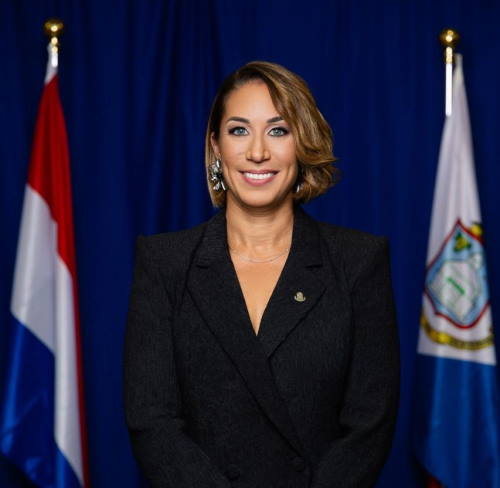Minister Tackling urges the public to expose wrongdoing. ~
 PHILIPSBURG: --- The Immigration and Naturalization Department (IND) faces a growing storm of corruption allegations, as Minister Nathalie Tackling’s recent remarks cast a harsh spotlight on the systemic rot plaguing the agency. During a tense exchange with SMN News during the press briefing on Wednesday July 9th, Tackling not only acknowledged the notorious backlog but explicitly called on the community to speak up and report illicit practices, laying bare a truth that many have long suspected: corruption is not just a suspicion, but a shadow looming over the department.
PHILIPSBURG: --- The Immigration and Naturalization Department (IND) faces a growing storm of corruption allegations, as Minister Nathalie Tackling’s recent remarks cast a harsh spotlight on the systemic rot plaguing the agency. During a tense exchange with SMN News during the press briefing on Wednesday July 9th, Tackling not only acknowledged the notorious backlog but explicitly called on the community to speak up and report illicit practices, laying bare a truth that many have long suspected: corruption is not just a suspicion, but a shadow looming over the department.
Corruption: The Worst-Kept Secret
For years, applicants have silently endured long waits and seemingly arbitrary barriers for essential documents such as landing permits and residence papers. Tackling’s revelation—that people have been coerced into paying “under the table” simply to have their documents processed—confirms what many have whispered. She urged citizens to report wrongdoings to the Landsrecherche, insisting, “You shouldn’t have to pay for the things that the government should provide to you.” Yet this plea is as much an indictment of the system as it is a call for reform. The widespread mistrust and fear that keep victims silent are products of years of governmental neglect.
Allegations of bribery and document manipulation are not isolated incidents. Tackling’s own words suggest the rot goes deep and may be further entrenched by a lack of internal cohesion within IND. Finger-pointing between departments, lost files, and inconsistent processing only fuel suspicion that those with the means—or the right contacts—can jump the queue, leaving honest applicants stranded and embittered.
When Victims Bear the Burden
The minister’s push for public action, though well-intentioned, forces victims to shoulder the responsibility for cleaning up the agency’s mess. Asking residents to step forward is little comfort when whistleblowers have long faced retaliation, and when accountability among public servants remains scarce. Tackling’s statement may ring true, but it also underscores the lack of robust safeguards and real consequences for those abusing the system.
Minister Tackling did not shy away from the elephant in the room—corruption may be behind the inexcusable delays still plaguing the IND. Files languish for more than six months; deadlines set by law are flouted with impunity. Meanwhile, Tackling’s promise to implement new safeguards and improve cooperation within the ministry is met with widespread skepticism. The public, weary of years of neglect and secrecy, finds little assurance in recycled pledges when evidence of meaningful change remains scant.
Worse still, Tackling’s admission that certain backlogs are “of people’s own making” suggests not only inefficiency but potential deliberate obstruction—another symptom of a system where personal gain takes precedence over public duty. The minister noted that similar dysfunctions exist in other ministries, revealing a larger, more pervasive culture of corruption within government ranks.
Despite assurances that some progress is being made, the IND’s failure to honor legal timelines and deliver transparent service continues to erode whatever trust might remain. Tackling’s aspiration continues to erode whatever trust might remain. Tackling’s aspirations to “clean up” the ministry sound aspirational, but for those trapped in bureaucratic limbo or forced to pay illicit fees, they feel hollow. As long as corruption is allowed to fester within the agency’s walls, meaningful reform remains an elusive promise.
Minister Tackling has thrown down the gauntlet both to her ministry and to the public, but the road to real accountability is long—and fraught with obstacles. Unless the government is willing to confront and excise corruption at its root, the cycle of inefficiency, bribery, and injustice will continue. For now, citizens are left to wonder if their courage to come forward will finally be matched by a government willing to protect them and put the public interest first, rather than continue a culture of complicity and silence.